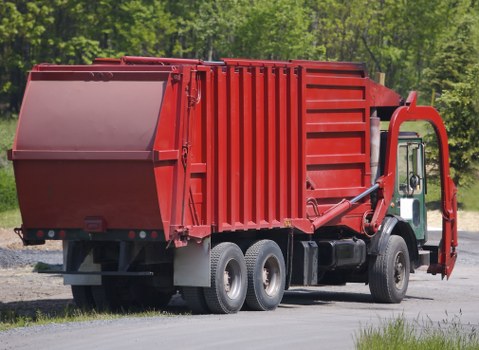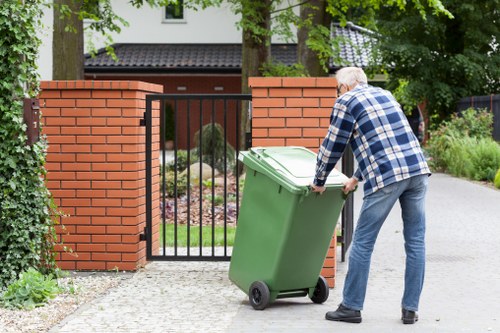Comprehensive Guide to Construction Waste Clearance in Kingston
Understanding Construction Waste Clearance

Construction projects, whether residential, commercial, or industrial, invariably generate significant amounts of waste. Efficient construction waste clearance in Kingston is crucial not only for maintaining clean and safe job sites but also for contributing to environmental sustainability.
Proper waste management ensures that debris and leftover materials are disposed of responsibly, minimizing the impact on the local community and ecosystem. In Kingston, a city known for its vibrant construction industry, effective waste clearance services are in high demand.
Implementing a robust waste clearance plan can streamline construction processes, reduce costs, and enhance the overall efficiency of projects.
Importance of Effective Waste Management

Effective waste management is a cornerstone of successful construction projects. It not only ensures compliance with local regulations but also promotes a sustainable approach to building.
In Kingston, waste clearance services play a pivotal role in maintaining the city's infrastructure and aesthetic appeal. By responsibly managing construction waste, contractors contribute to reducing landfill usage and lowering the carbon footprint of their projects.
Additionally, proper waste clearance can prevent potential hazards on construction sites, safeguarding workers and the surrounding communities.
Types of Construction Waste

Construction waste encompasses a variety of materials, each requiring specific handling and disposal methods. Common types include:
- Concrete and Masonry: Includes broken bricks, blocks, and concrete slabs.
- Wood: Timber, plywood, and scrap wood pieces.
- Metals: Steel beams, aluminum frames, and other metal scraps.
- Plastics: PVC pipes, plastic sheeting, and other plastic materials.
- Hazardous Materials: Asbestos, paints, solvents, and other toxic substances.
The Waste Clearance Process

Implementing an effective waste clearance process involves several key steps:
- Assessment: Evaluating the types and volumes of waste generated.
- Segregation: Separating recyclable materials from non-recyclables.
- Collection: Gathering waste materials from the construction site.
- Transportation: Moving waste to appropriate disposal or recycling facilities.
- Disposal: Ensuring waste is processed in compliance with local regulations.
Each step must be meticulously planned and executed to ensure efficiency and compliance.
Benefits of Professional Waste Clearance Services

Engaging professional waste clearance services in Kingston offers numerous advantages:
- Compliance: Ensures adherence to local waste management laws and regulations.
- Efficiency: Streamlines the waste removal process, saving time and resources.
- Safety: Reduces the risk of accidents and injuries on construction sites.
- Environmental Responsibility: Promotes recycling and reduces landfill dependency.
- Cost-Effectiveness: Minimizes costs associated with waste disposal and site cleanup.
By leveraging expert services, construction projects in Kingston can achieve higher standards of excellence and sustainability.
Selecting the Right Waste Clearance Partner
Choosing a reliable waste clearance partner is essential for the success of any construction project. Key considerations include:
- Experience: Proven track record in handling various types of construction waste.
- Compliance: Adherence to Kingston's waste management regulations.
- Capacity: Ability to manage the volume and types of waste your project generates.
- Recycling Initiatives: Commitment to environmentally friendly disposal methods.
- Customer Service: Responsive and supportive service to address your project's unique needs.
Investing time in selecting the right partner can lead to more efficient and hassle-free waste clearance operations.
Innovations in Waste Clearance
Advanced Recycling Technologies
Modern waste clearance services in Kingston are increasingly adopting advanced recycling technologies. These innovations enable the efficient separation and processing of materials, maximizing recycling rates and minimizing landfill use.
Digital Management Systems
The integration of digital management systems allows for real-time tracking of waste materials. This enhances transparency, improves scheduling, and ensures accountability throughout the waste clearance process.
Eco-Friendly Disposal Methods
Eco-friendly disposal methods, such as using biodegradable materials and reducing the use of harmful chemicals, are becoming standard practices in the industry. These methods align with global sustainability goals and local environmental policies.
Challenges in Construction Waste Clearance
Despite advancements, several challenges persist in the realm of construction waste clearance:
- Regulatory Compliance: Navigating complex local regulations can be daunting.
- Waste Segregation: Properly separating different types of waste requires meticulous planning and execution.
- Logistical Issues: Efficient transportation and timely disposal of waste materials can pose logistical challenges.
- Cost Management: Balancing effective waste management with budget constraints is often difficult.
Addressing these challenges requires a strategic approach and collaboration with experienced waste clearance providers.
Environmental Impact of Construction Waste
Construction waste significantly impacts the environment. Improper disposal can lead to:
- Land Degradation: Accumulation of waste can degrade land quality and aesthetics.
- Water Pollution: Hazardous materials can leach into water bodies, affecting aquatic life.
- Air Quality: Dust and emissions from waste disposal processes can deteriorate air quality.
- Resource Depletion: Excessive waste reduces the availability of recyclable materials.
By implementing effective waste clearance practices, the construction industry in Kingston can mitigate these adverse environmental effects.
Regulations Governing Waste Clearance in Kingston
Kingston enforces strict regulations to ensure responsible construction waste management. Key regulations include:
- Waste Segregation Requirements: Mandates the separation of recyclable and non-recyclable materials.
- Disposal Permits: Requires obtaining permits for waste transportation and disposal.
- Recycling Targets: Sets specific recycling rates that construction firms must achieve.
- Penalties for Non-Compliance: Imposes fines and sanctions for violations of waste management laws.
Understanding and adhering to these regulations is essential for maintaining operational compliance and avoiding legal repercussions.
Benefits of Recycling Construction Waste
Resource Conservation
Recycling construction waste conserves natural resources by reusing materials that would otherwise be discarded. This reduces the demand for raw materials and supports sustainable building practices.
Cost Savings
Recycling can lead to significant cost savings by reducing the need for purchasing new materials and lowering disposal fees.
Environmental Preservation
By minimizing waste and promoting recycling, the construction industry can lessen its environmental footprint, contributing to healthier ecosystems and communities.
Best Practices for Construction Waste Clearance
Implementing best practices ensures efficient and effective waste clearance operations:
- Early Planning: Integrate waste management strategies into the project planning phase.
- On-Site Segregation: Allocate designated areas for different types of waste to facilitate easy separation.
- Regular Monitoring: Continuously monitor waste generation and clearance to identify areas for improvement.
- Training Personnel: Educate workers on proper waste handling and segregation techniques.
- Partnering with Recyclers: Collaborate with local recycling facilities to ensure responsible processing of materials.
Adhering to these practices can enhance the efficiency of waste clearance and promote sustainability.
Future Trends in Construction Waste Clearance
Automation and Robotics
Automation and robotics are set to revolutionize construction waste management. Automated systems can streamline waste sorting, reduce labor costs, and increase processing speeds.
Smart Waste Management Systems
Integrating smart technologies enables real-time monitoring and data analysis, improving decision-making and operational efficiency.
Circular Economy Models
The shift towards circular economy models emphasizes the reuse and recycling of materials, fostering a more sustainable construction industry.
Choosing Kingston for Your Construction Waste Clearance Needs
Kingston offers a robust infrastructure and a network of professional waste clearance services tailored to the needs of the construction industry. The city's strategic location, combined with stringent environmental policies, makes it an ideal hub for efficient and responsible waste management.
Whether you're undertaking a large-scale commercial project or a residential build, Kingston's waste clearance solutions can be customized to meet your specific requirements.
With a commitment to sustainability and excellence, Kingston ensures that your construction projects not only succeed but also contribute positively to the community and environment.
Conclusion
Effective construction waste clearance in Kingston is indispensable for the success and sustainability of construction projects. By embracing responsible waste management practices, adhering to local regulations, and partnering with experienced waste clearance professionals, you can ensure that your projects are not only efficient but also environmentally friendly.
Investing in proper waste clearance strategies leads to numerous benefits, including cost savings, enhanced safety, and a reduced environmental footprint. As the construction industry continues to evolve, staying informed about the latest waste management trends and technologies will be key to maintaining a competitive edge.
Contact us today to learn more about our tailored waste clearance services and how we can support your next construction project in Kingston.